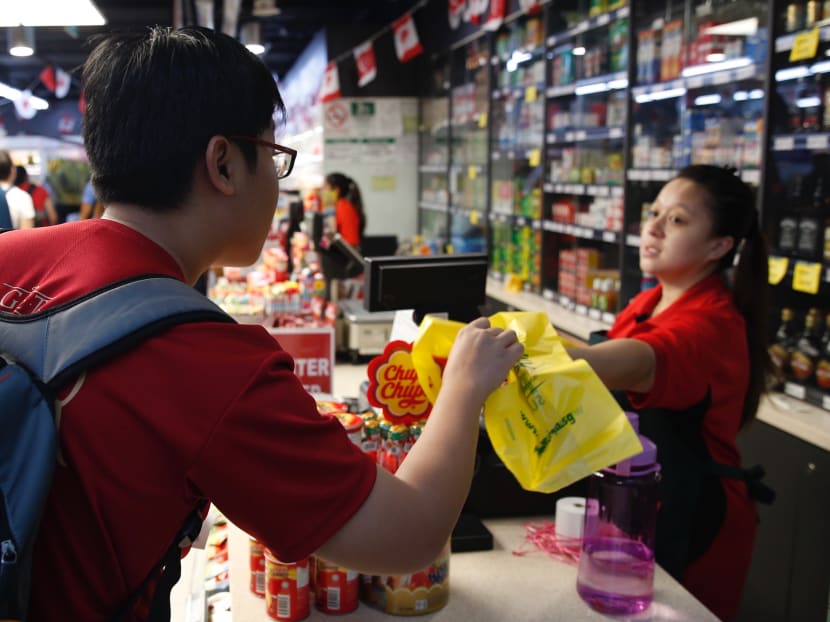MP calls for surcharge on all single-use bags, except those used for fresh produce
SINGAPORE — Consumers should pay for single-use carrier bags made of all materials – not only plastic – but bags used to carry fresh produce should be exempted from any charge, suggested Member of Parliament (Nee Soon) Louis Ng on Monday (Oct 1).

Member of Parliament Louis Ng said that the issue of plastic waste has reached a "turning point" and recommended that consumers be charged for all single-use shopping bags regardless of their material.
SINGAPORE — Consumers should pay for single-use carrier bags made of all materials — not only plastic — but bags used to carry fresh produce should be exempted from any charge, Mr Louis Ng said on Monday (Oct 1).
In this way, consumers will still have some free bags for binning their trash, but fewer plastic bags will be consumed overall.
Mr Ng, who is Member of Parliament for Nee Soon Group Representation Constituency (GRC), cautioned that the issue of plastic waste has “reached a turning point”.
“If we don’t do anything about it, there will be more plastics than fish in the ocean by 2050,” he said in an adjournment motion in Parliament.
The Government will continue to monitor developments on this front, replied Dr Amy Khor, Senior Minister of State for the Environment and Water Resources.
In March, the authorities said that it would not impose a charge on plastic bags, adding that substituting them with other types of disposable bags, such as paper ones, may not be better for the environment in Singapore’s case.
Paper and biodegradable bags may require as much resources to produce and have a similar environmental impact, as waste here is incinerated before going to the landfill and not left to decay, Dr Khor said at the time.
The British government estimated that a cotton tote bag must be used 173 times before its greenhouse gas emission impact improves beyond the plastic bags we use to line our bins, Dr Khor said on Monday.
The issue of charging consumers for plastic bags has been the subject of animated debate for years in Singapore.
On Mr Ng’s proposed approach — which is what Hong Kong has done — Dr Khor said it complicates the system and makes enforcement more difficult. Some reports have stated that non-compliance by retailers in Hong Kong is about one-third to half, she said.
Mr Ng noted that there are critics of what Hong Kong is doing. “But at least Hong Kong is trying, and I’d rather be optimistic and say, not bad, 50 per cent of retailers are compliant, good start,” he said.
Charging for carrier bags has been effective in cutting usage, he said. Lifestyle brand Miniso reported a drop of 75 per cent in customers’ plastic-bag usage after its stores began charging 10 cents for every such bag last year.
“This throwaway culture is so deeply ingrained… Even when I take my own reusable bag to the supermarket, the cashier sometimes puts my groceries first into a plastic bag, and then into my reusable bag,” Mr Ng said.
‘PLASTIC WRAPPED IN MORE PLASTIC’
In his speech, Mr Ng also urged the public sector to take the lead in reducing plastic waste. At this year’s National Day Parade (NDP), the fun pack contained “many plastic items individually wrapped in more plastic”, and each person received a plastic bag for waste items.
“If NDP 2019 were to use only reusable items with minimal packaging, it would send a strong signal that our nation is committed to building a sustainable world,” he said.
Dr Khor said public agencies have a best-practice guide on organising environment-friendly events. Her ministry does not serve bottled water at its meetings, for example.
However, major events such as the NDP may not be able to “do away entirely” with items such as bottled water because of the large number of people present.
In order to tackle packaging waste on a larger scale, Dr Khor announced that businesses will have to report the type and amount of packaging they put on the market and their plans for reduction by 2020, a year earlier than previously said.
The Government is also studying whether it is feasible to impose collection targets on businesses that use or produce packaging, through the Extended Producer Responsibility approach for packaging waste. A third of domestic waste comes from packaging.
More details on the initiatives will be released in the inaugural Zero Waste Masterplan, to be launched next year.
Plastic waste and marine plastics are a growing problem worldwide, killing a million seabirds and 100,000 marine mammals each year. A recent study found 1.8 trillion pieces of plastic weighing 80,000 tonnes now floating in the ocean between California and Hawaii.
Mr Ng added that Singapore is tackling symptoms of the problem, but Dr Khor disagreed and said the Government’s measures deal with the root cause of marine pollution.
She said: “Marine pollution is caused by improper disposal of plastic waste, and not the use of plastics per se."
The Government will continue addressing the issue of marine plastics pollution through “stringent anti-littering measures, educating the public against littering and excessive consumption of plastics, and introducing regulatory measures to minimise plastic and packaging waste upstream”.
“We will not hesitate to legislate where necessary. But we will do so by taking a pragmatic and considered approach that suits our local context,” Dr Khor said.
Sign up for TODAY's WhatsApp service. Click here:








